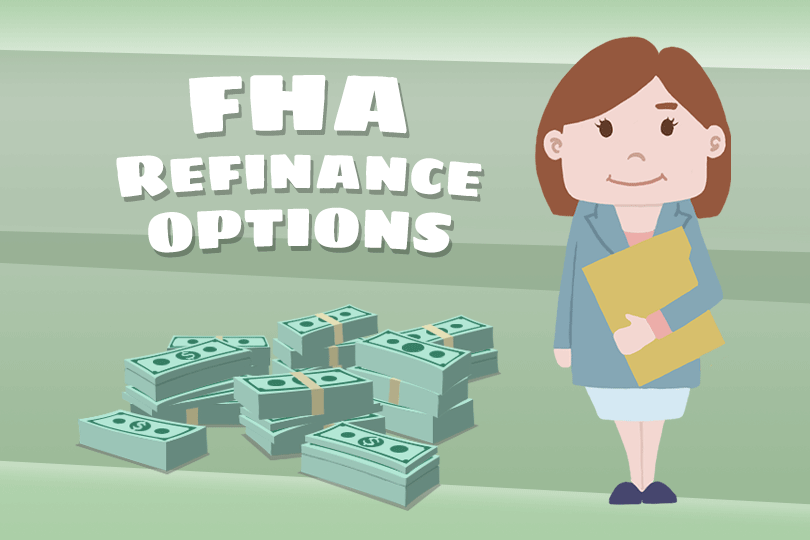Do I Need an FHA Refinance?
April 3, 2021
Reasons Why a Homeowner May Choose to Refinance
1. HISTORICALLY LOW RATES
If you are someone who goes into your bank regularly, you are probably used to a banker asking if you are interested in refinancing, since interest rates are “historically low.” It may seem like the word “historic” is thrown around a lot, it has been true since 2019. Interest rates started to decline in 2019 and have fallen steadily through 2020. The average rate for a 30-year, fixed rate home loan has fallen from 4.94% in November 2018, to 3.33% at the start of April 2020. A point drop in your interest rate could translate to huge savings with each monthly payment, which is why refinancing in such times can be a good idea.
2. SHORTENING YOUR TERM
Many borrowers also choose to refinance their mortgage so that their loan term is shortened. This may work for borrowers who have some long-term debts and enough money coming in each month to pay the mortgage off sooner. Shortening your loan term will mean increasing your monthly payments, so you will want to make sure your finances are managed and that your income is reliable. For many borrowers, it can be worth the higher payments, since shorter-term mortgages usually have lower interest rates, and borrowers end up saving on interest payments because they are paying it for a shorter amount of time.
3. GOING FROM ARM TO FIXED RATE MORTGAGE
A common reason many borrowers refinance is to go from an adjustable-rate mortgage to a fixed rate loan, usually because they want the security of a set monthly payment. Such refinances make the most sense when interest rates are low, probably before the introductory period on the ARM ends.
4. CONSOLIDATING YOUR DEBT
Many borrowers may choose a cash-out refinance to take better control of debt. By consolidating different loans (such as credit card bills and auto loans) into a one mortgage, they can have a single, fixed monthly payment, which is much easier to manage. Mortgages have lower interest rates compared to all other personal loans, so piling all your debt into a mortgage makes financial sense. Additionally, if it is timed right and interest rates are low, borrowers can also take advantage of market conditions and lower their monthly payment.
Is Now the Right Time?
It is impossible to say with certainty what the future holds and interest rates can change at any point, but they are expected to remain low till the end of 2020, if not longer. Capitalizing on the current market rates might be in your best interest and could lower your monthly payment significantly. However, refinances are at an all-time high and that means lenders are experiencing a huge number of applications, which could potentially make loans slower to process.
Refinancing also comes with closing costs, so for some mortgage holders, it might not be worth the time or money to deal with it. One rule of thumb for refinancing is that you should plan to live in your home long enough to break even. Do the math to see how long you need to reside in the home to recoup the cost of refinancing in the interest you save.
It is also important to keep in mind that during the Coronavirus pandemic, many lenders have increased their eligibility requirements for refinances, especially for government-sponsored programs like FHA loans, such as higher minimum credit scores more detailed proof of employment and income.
Ultimately, the future is uncertain, and interest rate projections can turn out wrong. However, if you have not had a mortgage review in the past couple of years, it is worth getting in touch with a loan officer to see if a refinance could save you some money in the long run.
------------------------------
RELATED VIDEOS:
Keep Your Eyes on Your Loan Balance
Learn About FHA Loan Prepayments
Taking Out a Home Loan Makes You a Borrower

FHA Loan Articles
December 17, 2024The Federal Housing Administration provides mortgage insurance on loans made by FHA-approved lenders, making homeownership more attainable for those who might not qualify for conventional loans.
While financial factors like credit score and debt-to-income ratio are key to loan approval, other non-financial aspects can also cause a denial.
December 11, 2024FHA loans, insured by the Federal Housing Administration, are a popular choice for many homebuyers, especially those who need a lower downpayment or more forgiving credit qualifying requirements. FHA loans are primarily intended for primary residences—homes that borrowers will occupy as their main dwelling.
December 10, 2024The FHA announced increased loan limits for 2025, providing those seeking FHA-insured mortgages after January 1st with increased purchasing power. In this article, we explore the key aspects of these limits and their implications for your homeownership goals.
When you are approved for an FHA-insured loan, the FHA guarantees a portion of the loan to the lender, lowering lender risk...
December 9, 2024The Federal Housing Administration (FHA) helps people buy homes, especially those buying for the first time or who might not have perfect credit. In 2025, there is good news for FHA borrowers. FHA home loan limits are going up.
In most places, the FHA loan limit for a single-family home in 2025 is $524,225. This is more than it was in 2024. However, in expensive areas, where houses cost more, the limit can be as high as $1,209,750.
December 5, 2024The Federal Housing Administration (FHA) has some ground rules regarding cash-out refinances. These rules are designed to protect both you and the lender, ensuring you have enough ownership of your home and reducing the risk of foreclosure. How long must you own your home before you can apply for FHA cash-out refinancing?







